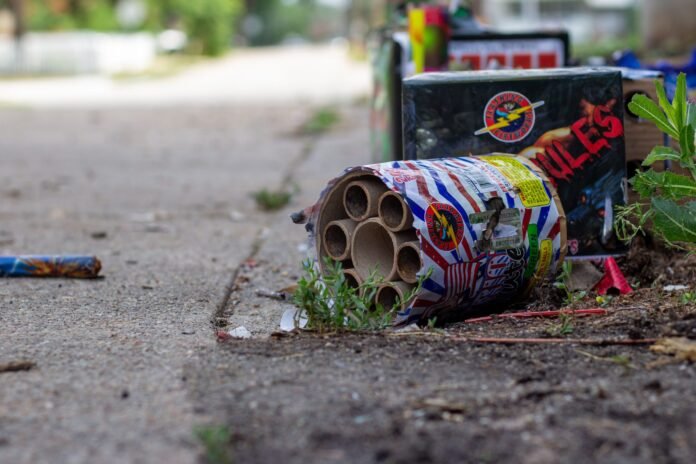When we think about the impact fireworks have, what comes to mind first? For many, it’s the awe we feel as we watch the explosions light up the evening skies around us in a dazzling spectacle of colors and shapes.
Perhaps less considered is the environmental impact left behind once the smoke has cleared.
The truth is, fireworks contain a variety of toxic chemicals—including heavy metals, sulfur-coal compounds, and other poisonous materials—and when we don’t take measures to properly clean up after each display, it has detrimental effects on people, wildlife, and the environment.
So, what exactly happens to the debris after the big boom? Spoiler: it doesn’t just dissipate into nothing.
Some byproducts stay suspended in the air, polluting the air that people and animals breathe, which can be especially harmful to those with respiratory conditions. Other toxins are attached to the product that falls back to the ground or into nearby bodies of water after the firework erupts.
The effects aren’t felt for only a day or two; research shows that certain toxins accumulate in soil, water, and even living organisms and cause long-term harm that lingers for years or decades.

The good news is, as with any other man-made hazard, humans can take action to help minimize the damage caused by holiday fireworks shows. And doesn’t a smaller footprint make for an even more enjoyable show?
One local organization is working to educate the public on these issues and encourage better cleanup practices.
Keep Omaha Beautiful is a local nonprofit that works to foster environmental and community stewardship through education, service, and advocacy.
The organization said safe cleanup practices help prevent firework waste from entering storm drains on the street, which flow to rivers and streams without being filtered or treated first. Proper cleanup helps protect the local waterways, neighborhoods, and parks that directly affect our quality of life.
The first, most obvious step is to clean up big debris left in the street. Even setting aside the risk of abandoned fireworks litter entering storm drains, any fragments left behind are still dangerous for people, pets, and wildlife.
The same goes for “microlitter.” It’s easy for very small pieces of fireworks measuring an inch or less to be washed into storm drains during a rainfall. It also poses a threat to wildlife that may ingest litter or use it for nesting. So grab a broom and dustpan, and sweep up all that you can.
Keep Omaha Beautiful has published a free Fireworks Cleanup Guide to help individuals and families reduce their impact while still enjoying the holiday. According to the guide, these four key steps can help protect our urban ecosystem:
- Be Safe and Wait 20. After the show, wait 20 minutes before collecting spent fireworks to make sure there are no burning materials. Wear gloves and use caution when picking up.
- Soak Fireworks. Submerge all spent fireworks (including any damaged, misfired, or unused fireworks) in a bucket or large tub of water for 15 minutes, or until completely saturated.
- Sweep Up and Bag. Sweep up the display area to collect all dust and small debris. If necessary, use a flashlight to illuminate the area. Place debris and soaked fireworks pieces into a plastic bag & seal it. Leave the bag in a safe place overnight, ideally in a metal container away from potential fire hazards. Place the sealed bag in the trash.
- Flush the Water. After removing all fireworks, the water used for soaking should be disposed of indoors down a toilet. Do not dump the water in the street or grass, and do not hose down the area. Flushing the water sends it through the municipal sewer system, which allows it to be filtered and treated. Dumping it in the street or grass or hosing down the area can wash the water used for fireworks into storm drains, which will carry the pollutants into local waterways.
Not only can you help by cleaning up after your own displays, you can also pitch in to help your neighbors, clean up nearby parks, or join a local coordinated effort.
Keep Omaha Beautiful is hosting a Star Spangled Community Cleanup Saturday, July 5 from 10 a.m. to noon in Hanscom Park to clean up fireworks in the area. The event is open to the public, and volunteers who help pick up litter will be provided with all necessary supplies.
The nonprofit also reminds people to be aware of their consumption during holidays. Committing to even one simple step toward sustainability makes a difference.
Here are some ways you can reduce, reuse, and recycle for a more sustainable holiday gathering:
- Only buy what you really need
- Choose reusable products over single-use
- Serve snacks in bulk instead of single-serving packages
- Reduce food waste by saving leftovers
- For decorations, focus on longer-lasting, reusable, or recyclable items
- Provide clearly marked recycling bins for guests
You can refresh yourself on what’s recyclable by viewing the Omaha Recycling Guide. Glass bottles can be saved and dropped off at a glass recycling drop-off site. Metro Landscape Materials & Recycling at 60th and Harrison streets offers free glass recycling.
When it comes down to it, gone are the days of consuming without a care. It’s 2025, and it’s up to each of us to do our part to minimize the footprint of our activities, celebrations, and traditions. Whether you choose to do it for yourself, your neighborhood, wildlife, or some other reason—future generations will thank you for taking action to limit pollution any chance you get.






